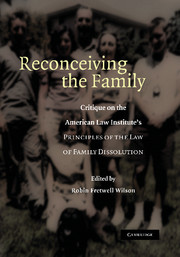 Reconceiving the Family
Reconceiving the Family Book contents
- Frontmatter
- Contents
- Acknowledgments
- Foreword, by Mary Ann Glendon
- List of Contributors
- Introduction
- PART ONE FAULT
- PART TWO CUSTODY
- PART THREE CHILD SUPPORT
- 6 Asymmetric Parenthood
- 7 Paying to Stay Home: On Competing Notions of Fairness and the Imputation of Income
- PART FOUR PROPERTY DIVISION
- PART FIVE SPOUSAL SUPPORT
- PART SIX DOMESTIC PARTNERSHIP
- PART SEVEN AGREEMENTS
- PART EIGHT JUDICIAL AND LEGISLATIVE PERSPECTIVES
- PART NINE INTERNATIONAL REFLECTIONS
- Afterword: Elite Principles: The ALI Proposals and the Politics of Law Reform, by Carl E. Schneider
- Index
7 - Paying to Stay Home: On Competing Notions of Fairness and the Imputation of Income
Published online by Cambridge University Press: 25 January 2010
- Frontmatter
- Contents
- Acknowledgments
- Foreword, by Mary Ann Glendon
- List of Contributors
- Introduction
- PART ONE FAULT
- PART TWO CUSTODY
- PART THREE CHILD SUPPORT
- 6 Asymmetric Parenthood
- 7 Paying to Stay Home: On Competing Notions of Fairness and the Imputation of Income
- PART FOUR PROPERTY DIVISION
- PART FIVE SPOUSAL SUPPORT
- PART SIX DOMESTIC PARTNERSHIP
- PART SEVEN AGREEMENTS
- PART EIGHT JUDICIAL AND LEGISLATIVE PERSPECTIVES
- PART NINE INTERNATIONAL REFLECTIONS
- Afterword: Elite Principles: The ALI Proposals and the Politics of Law Reform, by Carl E. Schneider
- Index
Summary
The Principles' child support provisions try to respect and give weight to the interests of the parents while minimizing damage to the child or children at issue. The result is an impressive, balanced treatment in an area fraught with difficulty. This chapter focuses on one specific issue which helps illustrate some of the competing interests and rationales which are involved when decisions about child support must be made – namely, the conditions under which the ALI and various jurisdictions in the United States believe income should be imputed to a stay-at-home parent.
A number of important, competing considerations are at issue when deciding income attribution questions. As a general matter, jurisdictions believe that children should not be put at a disadvantage merely because their parents are no longer living together. They also believe that where practicable all parents should maintain close relationships with and contribute to the support of their children. In many instances, these goals conflict and compromises must be reached. It is not surprising, then, that different jurisdictions reach different conclusions about how to weigh these sometimes competing considerations and thus have adopted different policies with respect to when income should be attributed to a stay-at-home parent.
One confusing aspect of the ALI proposal is that the reasons offered in support do not fit tightly with the drafters' recommendations. While sensible and legitimate, the considerations articulated by the drafters support both the policy proposed and a number of other policies.
- Type
- Chapter
- Information
- Reconceiving the FamilyCritique on the American Law Institute's Principles of the Law of Family Dissolution, pp. 142 - 162Publisher: Cambridge University PressPrint publication year: 2006
